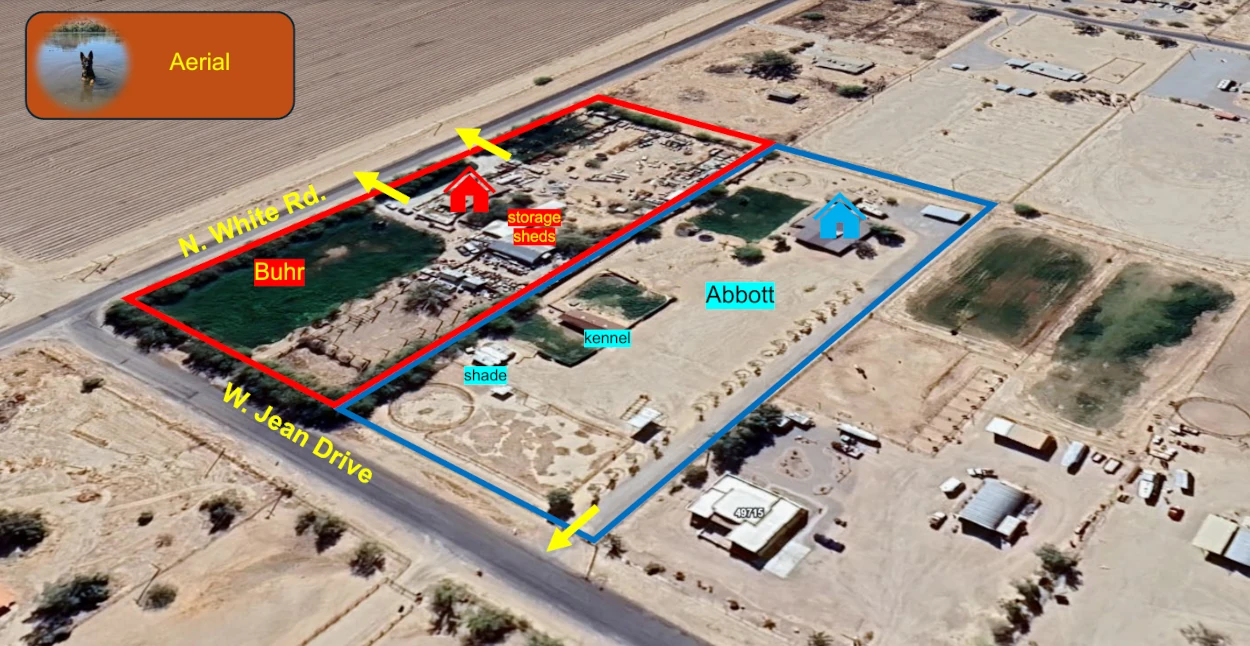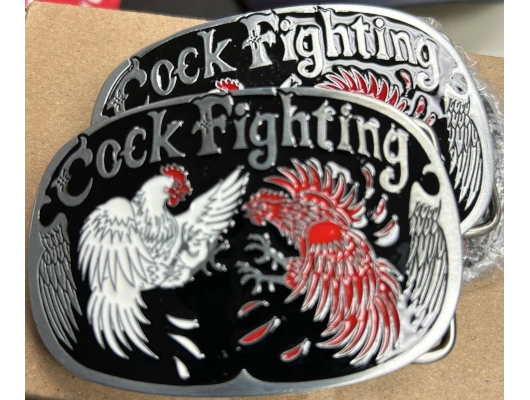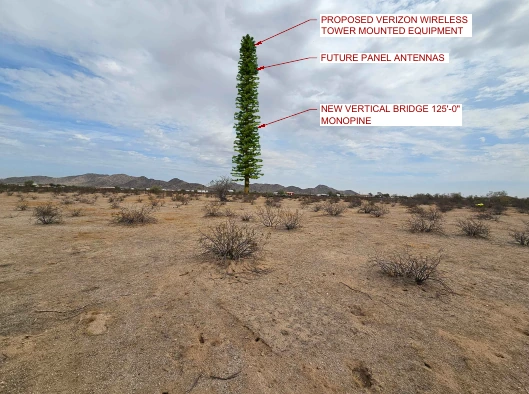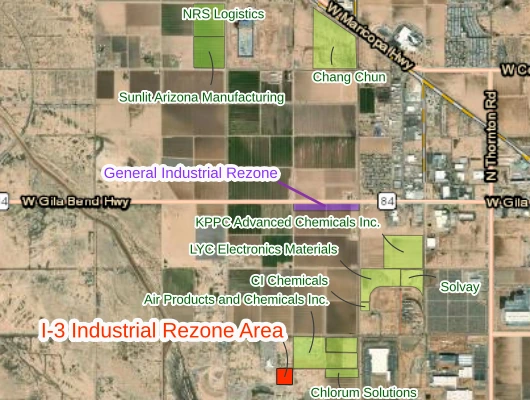The Pinal County Board of Supervisors split their decisions on two related German Shepherd breeding operations during their July 2, 2025 meeting, approving the Val Vista permit in a 4-1 vote and rejecting the Jean Drive permit by a 2-3 margin—decisions that underscored ongoing divisions over rural zoning enforcement.
The two cases, SUP-006-23 and SUP-007-23, involved German Shepherd breeding operations operated by mother and daughter on separate properties. Both properties are located in the Maricopa area and operate as connected family businesses spanning 31 years at the Val Vista location and nine years at the Jean Drive property. The Jean Drive property at 49641 West Jean Drive sits adjacent to the Buhr family’s property, whose complaints initially triggered the county’s enforcement action.
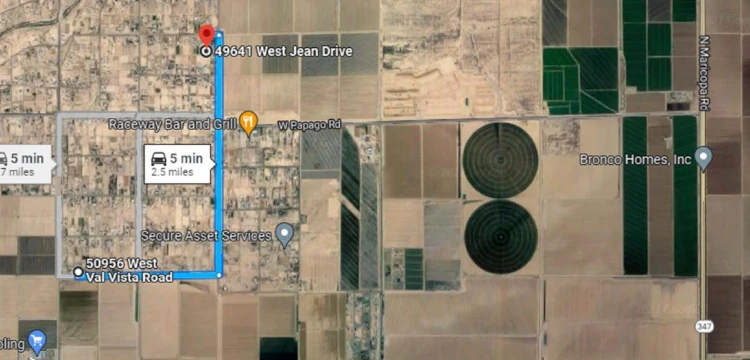
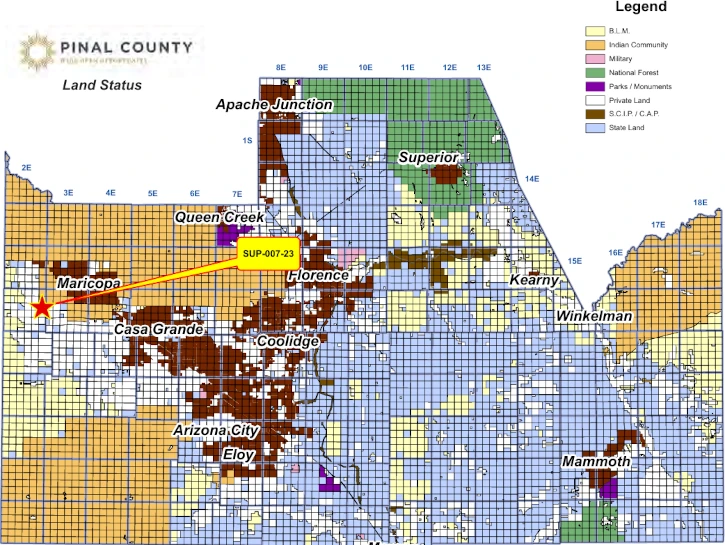
Background from Previous Hearings
As detailed in a previous Pinal Post article, the board remanded both applications back to the Planning and Zoning Commission in May after staff amended stipulations without formally returning them to the Planning and Zoning Commission for public review, prompting a remand to correct the process. The Planning and Zoning Commission initially recommended approval of the Jean Drive property by a 9-1 vote in March with the original stipulation set, and reaffirmed that recommendation 8-0 in June following the Board’s remand and review of revised stipulations. The approved Val Vista property received an 8-0 recommendation in June after the remand process that included additional fence requirements and dog limitations.
Updated Case Status
The July 2 hearing marked the final consideration of both applications after months of proceedings. Senior Planner Patrick Zaia-Roberts reported that staff had received significantly more public input since the initial hearings. For the rejected Jean Drive property, the county received 42 letters of opposition and 132 letters of support. The approved Val Vista property generated 40 letters of opposition and 131 letters of support.
Public Opposition and Support Sources
The support and opposition came from various sources and included both individual letters and signed petitions. Shell Abbott reported having “392 signatures and 71 letters” of support, though she noted “I did not get those last 41 letters though, to Patrick in time,” indicating that the county’s official count may not reflect all the materials submitted or received.
Jason Sanks argued that many opposition petition signers do not live within close proximity to the Jean Drive property, characterizing the situation as primarily “a neighbor dispute” involving “one neighbor that’s in opposition to the Abbotts.” This argument attempted to discredit the volume of opposition by questioning whether those signers were materially impacted by the operation.
The support letters came primarily from customers who had purchased dogs from the Abbott family operation. Gary Metivier argued that the support letters carried less weight since the customers “do not live next door or in the vicinity of the applicant’s location and do not have to suffer any of the negative aspects of living in the vicinity of such a business operation.”
Shell Abbott noted that she had “letters that I’ve gotten from support within 300 feet of my property” and mentioned that during neighborhood meetings, she had neighbors attend in support of the operation.
Public Support
Supporters emphasized the quality of the breeding operation and community engagement. Letters detailed the Abbotts’ “exceptional German Shepherd breeding program,” describing dogs with “balanced temperament” and “remarkably friendly” dispositions. Multiple testimonials praised the “meticulous care and cleanliness” of facilities and “calm and controlled environment” during visits.
Joe and Carol LeDuc characterized the operation as exemplifying “the highest standards of responsible and ethical breeding,” noting the Abbotts’ transparency about practices and comprehensive health records. Customers praised the Abbotts’ professional communication, thoughtful dog matching, and continued support after adoption.
Public Opposition Arguments
Opponents raised multiple concerns about both operations during the hearing process. Bill Vincett, who identified himself as a Thunderbird Farms resident, argued that approving the permits would “set a dangerous precedent” and “undermine the zoning protections that residents rely on.” He specifically mentioned noise complaints, stating his wife “has experienced the barking at feeding time of this property” and calling it “ridiculously loud.”
The Finley household, residing two properties away from the approved Val Vista location for over two decades, detailed “significant and repeated issues” including animals escaping and roaming streets, aggressive behavior from dogs breaching fences, and “persistent noise disturbances due to continuous barking.” They expressed concerns that stipulations would not adequately address ongoing problems, noting that “bark collars require regular charging or battery replacement, and when left on for extended periods can cause skin irritation to the animals.”
Matthew Williford, field manager for Papago Domestic Water, reported safety concerns for his meter reader, indicating the dogs “have become aggressive towards my meter reader Perry Holmes. For safety reasons he now carries mace when reading that particular area.”
Gary Metivier, through a statement read by Amanda Jackson, opposed rewarding “long-term violators” with permits and recommended a moratorium on animal breeding SUPs until new codes are approved. He warned that SUPs “are permanent and when this Board approves them, you are setting a precedent.” He also contended that support letters from customers should be disregarded since they “do not have the topic at issue, that being an SUP at their point of argument.”
Vitiello’s Detailed Enforcement Concerns
Supervisor Rich Vitiello conducted extensive questioning that revealed several compliance issues. He challenged claims about bark collar usage, pointing out he had visited the property and “none of the dogs had bark collars” despite repeated assertions that dogs always wore them.
Vitiello also questioned the commercial versus non-commercial permit status, noting that applicants had applied for non-commercial permits while operating a business. He declared “You’ve been running illegal for 30 years” based on the first kennel license application being in 2016 despite operations dating to the 1990s and requirements that commercial operations obtain proper permits.
Regarding code compliance, Vitiello emphasized “I know I need a driver’s license. I know I need to go renew it every 10 years, whatever it is. My point being is, it’s in black and white.”
Stipulations and Enforcement
Both applications included extensive stipulations designed to address neighbor concerns. Key requirements included limiting breeding dogs to seven adults, housing all dogs in kennels by 9:00 PM, implementing noise mitigation measures including bark collars, and maintaining valid county animal control licenses.
The rejected Jean Drive property faced additional requirements including construction of a seven-foot fence along the neighbor’s property line within four months of approval. However, Russell Byers clarified during the hearing that their existing fence measures “six foot nine and a half inches” rather than seven feet as previously stated, apologizing that “I was told it was a seven-foot fence. It’s not, so I’m sorry.”
The Planning and Zoning Commission revised the excessive barking stipulation to define quiet hours as between 9:00 PM and 6:00 AM, aligning it with the kennel curfew hours for clarity and consistency.
Supervisor Perspectives on Rural Compliance
Supervisor Mike Goodman emphasized broader issues with rural property compliance, declaring “I’ll bet you 80% of our properties in these rural communities are out of compliance for something.” He argued for focusing on future compliance rather than past violations: “For me, it’s eliminating any kind of violations in the past, but determine where we’re gonna go from here moving forward.”
Goodman criticized internal county communication problems: “We’re not having proper communication internally and helping these applicants determine where they need to go. We need to have better processes to get us to point, from point A to point B to point Z.”
He defended the special use permit process, explaining that “special use permits allow us to go outside of what the codes and ordinances state. That’s what a special use permit is there, to allow these type of businesses.” He also emphasized supporting entrepreneurship: “We wanna try to encourage the American dream of home-based business, of being in business for yourself. I think that’s everybody dream, is being in business for yourself.”
In response to Vitiello’s enforcement concerns, Goodman responded with an analogy: “And the speed limit’s in black and white too. But an officer has the ability to give you a warning or give you a ticket.”
Kennel Permit Classifications
A significant portion of the hearing addressed confusion over commercial versus non-commercial kennel permits. Animal Care Director Audra Michael clarified the four permit types: Class 1 for personal dogs up to seven, Class 2 for personal dogs up to 12, Class 3 for non-commercial operations like rescues, and Class 4 for commercial operations involving “boarding, breeding, training. Anywhere where they’re making money and providing a business service.”
Senior Planner Patrick Zaia-Roberts confirmed that the rejected Jean Drive property currently holds “a class four commercial kennel permit” despite previous confusion about permit classifications. However, the kennel permit alone does not override zoning requirements, and a special use permit is still required under county land use rules.
SUP Authorization Clarification
Chairman Stephen Miller questioned whether SUPs for kennels were actually permitted, noting that “numerous times, it’s been that an SUP for a kennel is not permitted.”
Senior Planner Patrick Zaia-Roberts clarified that the Planning and Zoning Commission had authorized kennel SUPs under “provision O” of the Pinal County Development Services Code, which allows any use the Planning and Zoning Commission deems appropriate under special circumstances. This authorization came during a January 18, 2024 Planning and Zoning Commission hearing that “initiated the discussion for the SUP process” for five separate kennel cases.
Miller confirmed his understanding: “So it is permitted because we gave, we gave the okay. Through an action of the commission.”
Animal Control Testimony
Animal Care Director Audra Michael corrected several misconceptions during her testimony. Regarding complaints specifically about the Jean Drive property, she testified “We got one barking complaint, I wanna say, in 2018, but nothing since then.”
Michael acknowledged past confusion about SUP requirements: “We were really not sure how SUPs work. We never really thought to tell them that they needed an SUP until about the last few years. I do believe when Mr. Billingsley, the county’s Development Services Director, took over, I think that’s when we started looking into getting SUPs.”
Despite her general skepticism about breeders, Michael praised the Abbott operations: “As much as I don’t really care for breeders, if they’re going to be a breeder and they’re going to be a reputable one, then the Abbotts were not what I would call illegal kennel breeders. They are actually doing what they’re supposed to be doing.”
Historical Compliance Issues
The hearing revealed confusion about permit requirements dating back decades. The record shows a prolonged period of ambiguity in enforcement, with neither zoning nor animal control consistently identifying the need for SUPs until recent years.
Jason Sanks, representing the applicants, explained that “it was unbeknownst to both Ranelle and Shell that they needed a special use permit. And in fact, in the mid-2000s, it wasn’t required.”
Shell Abbott described her understanding when building the kennel: “When we went to Zoning, we told them exactly what we were doing, that we were building a kennel for our dogs. And they said, ‘As long as you don’t have other people’s dogs, you’re not boarding, you’re not training, then it would still be a personal kennel and it would not need commercial zoning.'”
Abbott also confirmed that county departments failed to inform her of SUP requirements: “When I was getting my federal license, the FDA didn’t say anything about it. When I got my kennel permit when I for my zoning, they didn’t say anything about it. When I went to Pinal County Animal Care and Control, nothing was said at that time either.”
Russell Byers clarified business operations regarding puppy transactions. Byers distinguished between the physical pickup location and where the actual sales are processed. While he stated that “no puppies are sold from our house” at the Jean Drive location, the applicant narrative indicates that many pickups occur at Jean Drive, though the financial transactions are handled through the approved Val Vista operation.
Applicant Compliance Measures
The Abbott family demonstrated various efforts to address neighbor concerns and achieve compliance. Shell Abbott described installing “a view fence so he can now walk all the way up to her property line without even seeing my dogs” to address the Buhr family’s concerns.
The applicants worked with county staff to develop comprehensive stipulations and expressed willingness to accept additional requirements. Both properties have maintained animal control permits and passed annual inspections. Shell Abbott confirmed “they came out and checked on that, and they’re the ones that enforce the number of dogs and the health of the dogs and check on those kind of things also.”
The approved Val Vista location will operate under ten stipulations, while the Jean Drive denial means that operation must cease or face code enforcement action. With Val Vista moving forward and Jean Drive denied, the board’s split decision ends a prolonged public process—but leaves open broader questions about rural enforcement, kennel oversight, and SUP consistency across unincorporated Pinal County.
